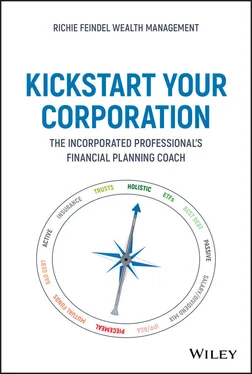1 Cover
2 Acknowledgments Acknowledgments I would like to thank my business partner and good friend Kyle Richie. Since working together in 2004, we have shared a vision for improving wealth management, and have implemented many of those ideas mentioned in this book. Kyle was ranked #1 by Wealth Professional in 2018 and has been a keynote speaker at investment conferences globally. As a top ranked advisor in Canada, he has successfully mentored many young financial advisors. We are both fortunate to work with each another and I look forward to many more years together. Thank you to all the clients we have worked with over the years for their support and validation; Alexandra Macqueen for her help with streamlining the writing and asking “Why don't you write another book?”; Paul Matthews and Alexander Herman for their help with this book's title; Volt Chan, James King, Frank Santelli, Dan Collison, Sue Neal, and Ermos Erotocritou for their leadership; Serena Dang and Harpreet Wadehra for their sound accounting advice; Martin Houser, Mark Fox and Alison Minard for their legal advice which always challenges; Ty Wehrenberg and Glen McCrum for all their opinions; Jeremy Enwright, Ryan Shoemaker, Rachelle Allen, Tara McCue, Rob Gray, Erin Blair, and Edwin Pavey for making work fun; Alex Loh, Lisa Johnson, Yola Guo, Jennifer Olvet, Dylan Biggs, Coby Tiffin, and all our administrative team—thank you for putting up with us; Jack Courtney, Blair Evans, and Christine Van Cauwenberghe for their always diligent insights; the welcoming teams at Richardson GMP, especially Craig Bassinger and his team; the Horwood sisters and Bakish brothers; and the supportive team at Wiley for their input and revisions. Lastly, thank you to my family and friends, especially James Obaji for his perspective on these financial issues and our late best friend Joe Magnotta, who always wanted people around him to succeed. It was Joe's idea to hold our first financial planning seminar titled “Wealth and Wine” at his parents' winery—the first step in our journey. 100% of the proceeds of this book will be donated to charity.
3 About the Author About the Author A ndrew Feindel CFA, CFP, CLU, CSWP, CIM, FMA, CSA, FCSI, HBA (Ivey) Senior Vice President, Investment Advisor Andrew.Feindel@richardsongmp.com Andrew Feindel is a Senior Vice President and Investment Advisor at Richardson GMP. Andrew is a co-author of Kickstart: How Successful Canadians Got Started (published 2008, Dundurn) where he interviewed 70 prominent Canadians including former prime ministers (Brian Mulroney), Native leaders (Matthew Coon Come), physicians (Dr. James Orbinski), business owners (Jim Pattison), cartoonists (Lynn Johnston), astronauts (Dr. Roberta Bondar), and ballet dancers (Karen Kain). He built his career around understanding both the nuances of wealth and, perhaps more importantly in his chosen profession, the nuances of people when it comes to wealth. A graduate of Upper Canada College's class of 2000, Andrew went on to graduate from the Richard Ivey School of Business and the Stockholm School of Economics with an honours degree in business administration. Sixteen years ago he joined Kyle's physician and dentist-focused practice and brought his deep understanding of the medical field with him — his father is a cardiac surgeon in Toronto, his grandfather was a neurosurgeon inducted into the Canadian Medical Hall of Fame, and his wife is a nurse. Andrew has regularly appeared in the media, including the Financial Post, Globe and Mail, Reader's Digest, and CBC. He was also recognized by Wealth Professional magazine in 2017 and 2019 as one of a small group of up-and-coming young advisors poised to lead Canada's wealth management industry into the future. Andrew holds many professional certifications, including the Chartered Financial Analyst (CFA), Certified Financial Planner (CFP), Chartered Life Underwriter (CLU), Chartered Strategic Wealth Professional (CSWP), Chartered Investment Manager (CIM), Financial Management Advisor (FMA), Certified Senior Advisor (CSA), and is a Fellow of the Canadian Securities Institute (FCSI).
4 Introduction: The Value of a Coach Introduction: The Value of a Coach “Another financial planning book,” you may be thinking. “What value will this be to me?” The shelves of your local library and bookstore are already filled with every imaginable book on finances: budgeting, business planning, investments, retirement planning, tax planning, planning your estate, how to save money, best practices for businesses, and more. What value could one more provide? The truth is, this book is unlike any other you've encountered. Whereas most other books provide copious amounts of information and detail about financial topics, very few provide concise, targeted, and pragmatic guidance with a boots-on-the-ground perspective from a team that's “been there, done that.” And even fewer are written for you, the incorporated professional. This book aims to change all that. From whether and when you should make the decision to incorporate, to the proper place of insurance in your financial plan, to how and where to invest and how to keep the taxman at bay, to the use of trusts and charitable donations, what you're holding is a complete, yet concise, guide to everything that matters in your financial life as an incorporated professional. I wrote this book because I saw a gap in the advice that's available to people like you. Together with my business partner, we've built a very successful financial planning practice serving the needs of incorporated professionals, and now is my time to give back. In our practice, I see a lot of misconceptions and even mistakes that need course-correcting. These blunders happen because people don't have a reliable and accessible source of the guidance they need—and, I would argue, deserve—for organizing and managing their financial lives as incorporated professionals. As you're reading along, think of this book as your own financial planning coach. Like any good coach, the book will help you look at your current state of affairs, and then provide direction to enhance the results you're getting—now and in the future. Working through the ideas in this book may involve some unlearning on your part, whether that's related to how and where you invest or the way you think about how to accomplish the goals you have for yourself and your business. My only request is that you enter with an open mind, ready to discard some rules of thumb that you may have heard for decades but, in reality, don't work for you and your situation.
5 Chapter 1: Incorporation 101 Chapter 1 Incorporation 101 If you're reading this and you're not incorporated, you need to call your financial planner right now and ask them why they haven't recommended that you incorporate. One of my best friends is a very successful family doctor in Ontario. We made sure that as of day 1 in his career—before he'd even received his first Ontario Health Insurance Plan (OHIP) payment—his medical professional corporation was set up and properly structured. Over the course of his career, this single move has saved him hundreds of thousands of tax dollars. So if you're a practicing professional, and you're not incorporated, why not?
Why Incorporate? Why Incorporate? Here's the answer: the rationale for incorporation is the difference between paying income taxes at your personal rate, which can be as high as 53.53% (Ontario's highest marginal rate in 2020 after $220,000 of income), or your corporate small business deduction (SBD) rate of 12.2% (Ontario's combined federal and provincial tax rate). But in addition to the (potentially substantial) tax benefits of incorporation, you will also get increased flexibility in choosing the government programs in which to participate and invest. A good financial planner should acknowledge that they have absolutely no control of the markets. While we do all try our best to spot trends and mispricings, in some form or fashion, we are always riding along with the ebbs and flows of market movements. Taxes, in contrast, we have complete control over (within the rules and parameters of the tax code). Taxes are factual, they are mathematics, they are “known knowns.” This means that we can master and control them. While we cannot avoid them, we have the ability to plan and mitigate some taxes. In our financial lives, our focus should be on controlling the controllable—and the corporation is a powerful tool that allows us to control our tax bill.
Читать дальше












